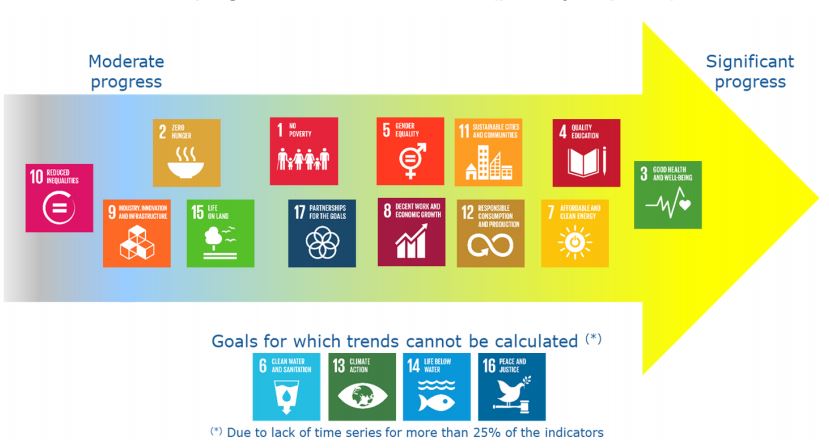Sustainable development aims to achieve a continuous improvement in citizens’ quality of life and well-being. This involves the pursuit of economic progress, while safeguarding the natural environment and promoting social justice.
For these reasons, sustainable development is a fundamental and overarching objective of the European Union and the progress towards the goals agreed at UN level in this area is regularly monitored and reported.
Eurostat, the statistical office of the European Union, issues today the publication “Sustainable development in the European Union — Monitoring report on progress towards the SDGs in an EU context – 2018 edition”. It provides a statistical overview of progress towards the SDGs in the EU.
Apart from the monitoring report, Eurostat is proposing a range of complementary materials:
- for a quick overview: a short brochure providing a visual summary of the monitoring report’s main findings,
- to play with: interactive visualisation tools for some of the 100 EU SDG indicators. A completely new
and innovative digital publication “SDGs & me” helps the reader focus on issues that are of interest
to them and compare their country with others, - to focus on individual goals: the series of Statistics Explained articles,
- everything under one roof.

EU progress towards the 17 SDGs (past 5-year period)
Significant progress towards the objectives for three SDGs and moderate progress for eight others over the past 5-year period
Overall, based on the indicators selected to monitor these goals in an EU context, the EU made progress towards
most of the 17 SDGs over the past five years. Progress for some goals has been faster than for others. In addition,
within goals, movement away from the sustainable development objectives also happened in specific areas. These
trends are described in the thematic chapters on the individual SDGs in the monitoring report.
The EU made strongest progress over the last 5 years towards the overall achievement of SDG 3 ‘good health and well-being’, followed by SDG 4 ‘quality education’ and SDG 7 ‘affordable and clean energy’.
For eight SDGs, the EU made overall moderate progress over the past five years. Such moderate trends are visible for SDG 11 ‘sustainable cities and communities’, SDG 12 ‘responsible consumption and production’, SDG 5 ‘gender equality’, SDG 8 ‘decent work and economic growth’, SDG 17 ‘partnership for the goals’, SDG 1 ‘no poverty’, and, to a minor extent, SDG 15 ‘life on land’ and SDG 2 ‘zero hunger’.
SDG 9 ‘industry, innovation and infrastructure’ is characterised by an equal number of positive and negative developments of the indicators.
Based on the selected indicators, the EU appears to have moved away from the sustainable development objectives for SDG 10 ‘reduced inequalities’ over the past five years. This is due to the continued rise of income inequalities within EU Member States, a development that is not specific for the past five years but that has already been visible since 2005.
In the case of four goals – SDG 6 ‘clean water and sanitation’, SDG 13 ‘climate action’, SDG 14 ‘life below water’ and SDG 16 ‘peace, justice and strong institutions’ – trends cannot be calculated due to insufficient data over the past five years.
In the monitoring report, indicator trends are assessed over two periods (when allowed by data availability): the short term, accounting for developments over the past five years, and the long term, looking at the trends over the last 15 years, to reflect the 15-year scope of the 2030 Agenda. To provide a snapshot of overall development for each SDG, a synopsis presents a summary at goal level, while thematic chapters, one for each of the 17 SDGs, provide a detailed assessment of each related indicator.
Geographical information
The European Union (EU) includes Belgium, Bulgaria, the Czech Republic, Denmark, Germany, Estonia, Ireland, Greece, Spain, France, Croatia, Italy, Cyprus, Latvia, Lithuania, Luxembourg, Hungary, Malta, the Netherlands, Austria, Poland, Portugal, Romania, Slovenia, Slovakia, Finland, Sweden and the United Kingdom.
For more information
Eurostat publication of 2018 edition of monitoring report: “Sustainable development in the European Union Monitoring report – 2018 edition“
Eurostat brochure: “Sustainable development in the European Union. Overview of progress towards the SDGs in an EU context“
Digital publication “SDGs & me“
Eurostat set of Statistics Explained articles on sustainable development in the EU